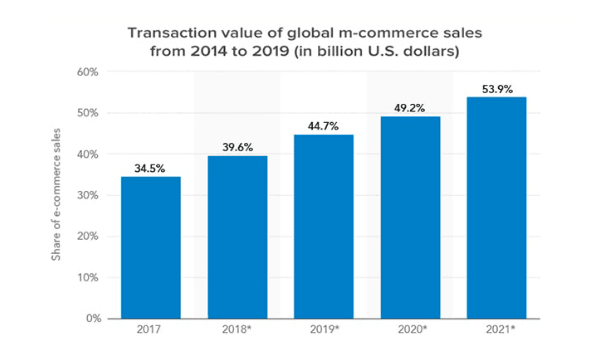Turn Your E-Commerce Store into Mobile Commerce App

Mobile Users have substantially increased in the past a few years. And that is one of the reasons why you should go for a mobile e-commerce app in this digital era. The business value of worldwide m-commerce will reach $460 billion in 2018 and 700 billion in 2019, and it is going to increase a lot in the future.
Besides, the same report forecasts a rise of mobile retail commerce sales equated to all e-commerce markets from 35 to almost 40% in 2018 and claims that in 2021 m-commerce will be more than 50% of the entire e-commerce sphere. People trust e-commerce sites, mobile ecommerce apps are so opportune and handy that people trust them more every day. E Commerce industry is not very different either. However, developing an app from scratch is a costly affair for small-time businesses and startups online marketplaces.
Adapting a Mobile Commerce App from an E-commerce Website
When you are creating your e-commerce app, then the app must not only be ready for testing on time but also has negligible bugs at the time of distribution. In this case, the ecommerce website and associated mobile commerce apps are going to share the same databases. Only the presentation of the information is going to vary from website to mobile commerce app.
1. Platform Identification
If you suffer on the internet, then you’ll find the platforms to build websites available in the market. When it comes to creating an app out of a website made from one these platforms then identifying the right platform is important. So, try to identify the best application development platform for a seamless app development. For instance, the process is a lot simpler for OpenCart but a bit tedious Magento.
2. Building Consistent Look & Feel
Since, you are developing on an existing ecommerce website that customers are accustomed with, so it will be a clever move to get the familiar look across the entire ecosystem of websites and mobile applications. This is why it’s important to retain this look and feel across the board. A consistent look is also essential for the branding purpose. The app view should reflect that of the website all the time and vice-a-versa. Any consistency is uncalled for and might alienate users.
3. API Development
A CMS is a closed structure of software components that makes it easy to create websites. Magento is one such CMS that, principally, makes ecommerce web development easier and profound. Since all the software components: platform, web server, database and frontend are part of the same system, they can exchange data without any problem. There is no security risk as such as all components are handled by the same party. That is not the case with mobile apps though. They don’t form a closed system with the database. To exchange data with the database in case of an app, the exchange takes place via a bridge called API, an acronym for Application Programming Interface.
4. API Integration
To increase the app efficiently, a tight integration of APIs and the application view is important for the app to work efficiently. The view adds a lot of information about the product. There is static information which sticks to the page and then there is dynamic information that is pulled by the API from the server. For instance, product prices are subject to change and must be pulled from the server by the application before showing it to the customer.
5. Testing
Testing is an integral part of an application’s post-development phase. A mobile app is tested for its various features and parameters. These features must work seamlessly, and a quality analysis team ensures the app is compliant with the client’s or a standard quality parameter like ISO 9001. There are also a lot of manual testing where a professional tester uses the app as any user would and reports any bug, if found.
6. Deployment
A quality mobile commerce app after public testing is then uploaded to an Application Store for distribution. Generally, there are two major stores, Apple App Store and Google Play Store. However, there are many 3rd party app stores. As such, mobile apps arry a lot of advantages to dynamic websites. There are reasons people are moving to a mobile-app strategy. Ecommerce vendors are insisting on apps over websites.
Features of Mobile Commerce Apps
There are few sets of functionality needed for e-commerce mobile app development. These features are necessary for a minimum viable product, it means that without any of these features your app would fail.
1. Authorization
Authorization before anyone can make a purchase on your website is really important. Everyday authorization is typically realized by means of direct interaction via the client-server API. Social Logging on the other hand uses an authorization protocol like oAuth.
2. Setting and Push Notification
Push Notification services are available on all major platforms. You can find APN and GCM respectively for iOS and Android. Settings can be attuned by means of client server API.
3. Catalogue with Categories
Every product listed on an ecommerce app has a unique ID in the database. In addition, they have a title, price and details. In addition, each category has a unique ID.
4. Different Payment Methods
There are many payment methods that you need to add in your ecommerce app. With various options you can give people different ways to pay.
5. Tracking Purchases
Tracking purchase allows users to check the status of an order. Ecommerce apps also implement a feature to withdraw it at the early stage. SMS functionality lets can notify customers when the direction is sent, managed, transported, etc. Twilio, Clickatell, Plivo are popular SMS gateways.
6. Shopping Cart
A shopping cart is fundamental to the functioning of e-commerce applications. Users sometimes add items in their cart on the app and checkout from the website so take a cue.
7. Customer Support
Customer Support via email, online chat, phone is essential. Popular ecommerce apps let their customers receive a callback from a service representative.
There is no point denying it but mobile apps have conquered the whole world and people’s hearts. In a few years, every service and company will have its own app with the same or even better functionality as in their websites.










